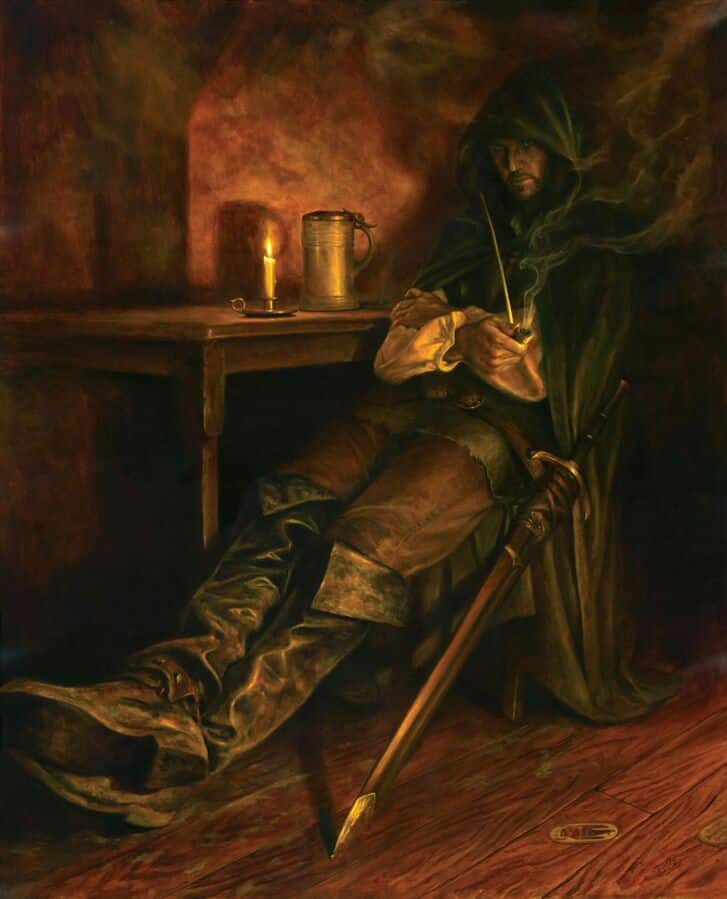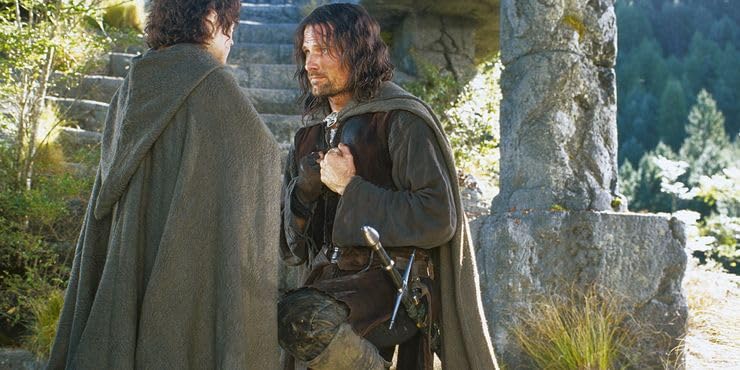This is a relatively short postscript to my recent post on Aragorn and the self-distance he consistently displays in his identifying with his “Strider” identity. In researching and preparing that post, I noticed a really small detail that’s previously escaped me. Right near the beginning of their conversation in the Prancing Pony, Strider offers to the hobbits that he may be able to tell them something to their advantage, and the following exchange takes place:
‘Several things,’ answered Strider. ‘But, of course, I have my price.’
‘What do you mean?’ asked Frodo sharply.
‘Don’t be alarmed! I mean just this: I will tell you what I know, and give you some good advice – but I shall want a reward.’
‘And what will that be, pray?’ said Frodo. He suspected now that he had fallen in with a rascal, and he thought uncomfortably that he had brought only a little money with him. All of it would hardly satisfy a rogue, and he could not spare any of it.
‘No more than you can afford,’ answered Strider with a slow smile, as if he guessed Frodo’s thoughts. ‘Just this: you must take me along with you, until I wish to leave you.’
‘Oh, indeed!’ replied Frodo, surprised, but not much relieved. ‘Even if I wanted another companion, I should not agree to any such thing, until I knew a good deal more about you, and your business.’
‘Excellent!’ exclaimed Strider, crossing his legs and sitting back comfortably. ‘You seem to be coming to your senses again, and that is all to the good. You have been much too careless so far. Very well! I will tell you what I know, and leave the reward to you. You may be glad to grant it, when you have heard me.’
The Lord of the Rings, Book I, Chapter 10, ‘Strider’, by J.R.R. Tolkien

The conversation between the hobbits and this grim dangerous Man then wanders this way and that, with (of course) Frodo eventually agreeing to allow this Strider fellow to guide them. But there’s something really subtle contained within the exchange that forebodes the eventual Breaking of the Fellowship.
For Aragorn does indeed accompany Frodo, all the way to Rivendell, and then far beyond, until their paths diverge at Amon Hen. But when it comes to Amon Hen, it is Frodo who leaves the company of Strider…and that, arguably, is in defiance of Strider’s condition that, “…you must take me along with you, until I wish to leave you.”
Yet perhaps not. For Frodo himself well knows that, while Aragorn would willingly accompany him to whatever end necessary, it is not necessarily his wish to do so. For weeks, Aragorn has wrestled with his duty to escort the Ring and his hope to come to Minas Tirith and lay claim to the kingship, as most memorably illustrated when the Fellowship sees the Argonath.
‘Fear not!’ he said. ‘Long have I desired to look upon the likenesses of Isildur and Anárion, my sires of old. Under their shadow Elessar, the Elfstone son of Arathorn of the House of Valandil Isildur’s son, heir of Elendil, has naught to dread!’
Then the light of his eyes faded, and he spoke to himself: ‘Would that Gandalf were here! How my heart yearns for Minas Anor and the walls of my own city! But whither now shall I go?’
The Lord of the Rings, Book II, Chapter 9, ‘The Great River’, by J.R.R. Tolkien
And Frodo himself recalls this wish when he makes the decision to cross the Anduin and continue to Mordor on his own.
Frodo rose to his feet. A great weariness was on him, but his will was firm and his heart lighter. He spoke aloud to himself. ‘I will do now what I must,’ he said. ‘This at least is plain: the evil of the Ring is already at work even in the Company, and the Ring must leave them before it does more harm. I will go alone. Some I cannot trust, and those I can trust are too dear to me: poor old Sam, and Merry and Pippin. Strider, too: his heart yearns for Minas Tirith, and he will be needed there, now Boromir has fallen into evil. I will go alone. At once.’
The Lord of the Rings, Book II, Chapter 10, ‘The Breaking of the Fellowship’, by J.R.R. Tolkien
So in the end, Aragorn does indeed “wish” to leave Frodo’s company (as per his initial deal), but it is Frodo who makes the decision and takes the action that forces Strider to leave (as itself is established by Strider’s follow up offer in Bree, that he will “leave the reward to you.”)
This, of course, is all rather different in the Jackson film, where Aragorn allows Frodo to depart and buys him time. And while I do not dislike the film version’s change, I do think that the events in the book both serve Frodo’s character better (in that he is given agency; something sometimes desperately lacking from Jackson’s version of the character) and ends up drawing a rather interesting example of the “exact words” of Strider’s initial promise being fulfilled (which is, of course, a typical element of myths and legends and fairy tales).
It’s a minor observation, ultimately, but also (as far as I am aware) a novel one, and one that’s rather fun to consider. Whether it’s even a deliberate detail on Tolkien’s part is hard to definitively say (though I do not think it is at all impossible, given his care for precision and meaning in language), but as, say, with the multiple ways in which Thorin’s Company is stricken by whether it technically numbers thirteen members, it’s an interesting piece of textual attention to detail and meaning.
~~~~~~~~~~~~~
Thanks for reading – feel free to check out anything else you may be interested in on the blog, there’s plenty more to discover! Follow me on Facebook and on Twitter to stay up to date with The Blog of Mazarbul, and if you want to join in the discussion, write a comment below or send an email. Finally, if you really enjoyed the post above, you can support the blog via Paypal, and keep The Blog of Mazarbul running. Thanks for reading, and may your beards never grow thin!
